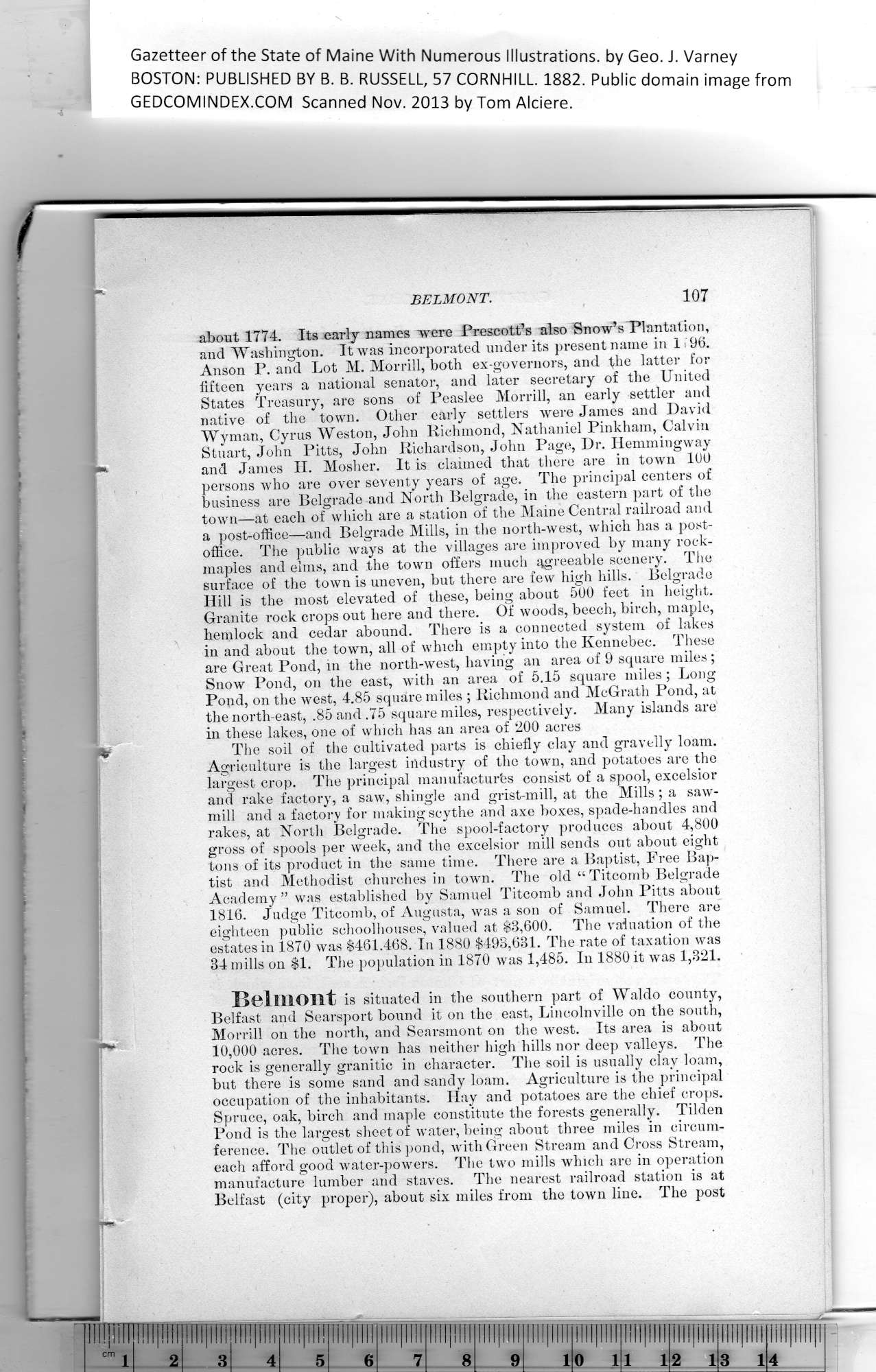|
Gazetteer of the State of Maine With Numerous Illustrations, by Geo. J. Varney
BOSTON: PUBLISHED BY B. B. RUSSELL, 57 CORNHILL. 1882. Public domain image from
BELMONT.
about 1774. Its early names were Prescott’s also Snow’s Plantation,
and Washington. It was incorporated under its present name in 1 f 96.
Anson P. and Lot M. Morrill, both ex-governors, and the latter for
fifteen years a national senator, and later secretary of the United
States Treasury, are sons of Peaslee Morrill, an early settler and
native of the town. Other early settlers were James and David
Wyman, Cyrus Weston, John Richmond, Nathaniel Pinkham, Calvin
Stuart, John Pitts, John Richardson, John Page, Dr. Hemmingway
and James H. Mosher. It is claimed that there are in town 100
persons who are over seventy years of age. The principal centers of
business are Belgrade and North Belgrade, in the eastern part of the
town—at each of which are a station of the Maine Central railroad and
a post-office—and Belgrade Mills, in the north-west, which has a post-
office. The public ways at the villages are improved by many rock-
inaples and elms, and the town offers much agreeable scenery. The
surface of the town is uneven, but there are few high hills. Belgrade
Hill is the most elevated of these, being about 500 feey in height.
Granite rock crops out here and there. Of woods, beech, birch, maple,
hemlock and cedar abound. There is a connected system offtakes
in and about the town, all of which empty into the Kennebec. These
are Great Pond, in the north-west, having an area of 9 square miles;
Snow Pond, on the east, with an area of 5.15 square miles ; Long
Pond, on the west, 4.85 square miles ; Richmond and McGrath Pond, at
the north-east, .85 and .75 square miles, respectively. Many islands are
in these lakes, one of winch has an area of 200 acres
The soil of the cultivated parts is chiefly clay and gravelly loam.
Agriculture is the largest industry of the town, and potatoes are the
largest crop. The principal manufactures consist of a spool, excelsior
and rake factory, a saw, shingle and grist-mill, at the Mills ; a saw-
mill and a factory for making scythe and axe boxes, spade-handles and
rakes, at North Belgrade. The spool-factory produces about 4,800
gross of spools per week, and the excelsior mill sends out about eight
tons of its product in the same time. There are a Baptist, Free Bap-
tist and Methodist churches in town. The old “ Titcomb Belgrade
Academy” was established by Samuel Titcomb and John Pitts about
1816. Judge Titcomb, of Augusta, was a son of Samuel. There are
eighteen public schoolhouses, valued at $3,600. The valuation of the
estates in 1870 was $461,468. In 1880 $493,631. The rate of taxation was
34 mills on $1. The population in 1870 was 1,485. In 1880 it was 1,321.
Belmont is situated in the southern part of Waldo county,
Belfast and Searsport bound it on the east, Lincolnville on the south,
Morrill on the north, and Searsmont on the west. Its area is about
10,000 acres. The town has neither high hills nor deep valleys. The
rock is generally granitic in character. The soil is usually clay loam,
but there is some sand and sandy loam. Agriculture is tbe principal
occupation of the inhabitants. Hay and potatoes are the chief crops.
Spruce, oak, birch and maple constitute the forests generally. Tilden
Pond is the largest sheet of water, being about three miles in circum-
ference. The outlet of this pond, with Green Stream and Cross Stream,
each afford good water-powers. The two mills which are in operation
manufacture lumber and staves. The nearest railroad station is at
Belfast (city proper), about six miles from the town line. The post
PREVIOUS PAGE ... NEXT PAGE
This page was written in HTML using a program written in Python 3.2
|
